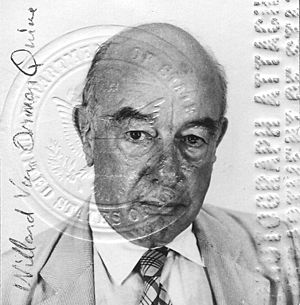Willard Van Orman Quine facts for kids
Quick facts for kids
Willard Van Orman Quine
|
|
|---|---|
 |
|
| Born | June 25, 1908 |
| Died | December 25, 2000 (aged 92) |
| Education | Oberlin College (B.A., 1930) Harvard University (Ph.D., 1932) |
| Spouse(s) |
Naomi Clayton
(m. 1932; div. 1947)Marjorie Boynton
(m. 1948; died 1998) |
| Awards | Rolf Schock Prize in Logic and Philosophy (1993) Kyoto Prize (1996) |
| Era | 20th-century philosophy |
| Region | Western philosophy |
| School | Analytic Mathematical nominalism (1947) Mathematical quasi-empiricism (1960) Immanent realism Neopragmatism Empiricism Anti-foundationalism Logical behaviorism |
| Institutions | Harvard University |
| Thesis | The Logic of Sequences: A Generalization of Principia Mathematica (1932) |
| Doctoral advisor | Alfred North Whitehead |
| Other academic advisors | C. I. Lewis |
| Doctoral students | David Lewis, Gilbert Harman, Dagfinn Føllesdal, Hao Wang, Burton Dreben, Charles Parsons, John Myhill |
| Other notable students | Donald Davidson, Daniel Dennett |
|
Main interests
|
Logic, ontology, epistemology, philosophy of language, philosophy of mind, philosophy of mathematics, philosophy of science, set theory |
|
Notable ideas
|
List
New Foundations, abstract objects, indeterminacy of translation (holophrastic indeterminacy, inscrutability of reference, ontological relativity, gavagai), radical translation, referential transparency, naturalized epistemology, meta-ontology, ontological/ideological commitment, natural kind, semantic ascent, Quine's paradox, Duhem–Quine thesis, Quine–Putnam indispensability thesis, semantic holism (confirmation holism, web of belief, hold come what may), extensionalism, problem of empty names, propositional attitude, two dogmas of empiricism, principle of charity, cognitive synonymy, , mathematical quasi-empiricism, Quine–McCluskey algorithm, Quine–Morse set theory, vivid designator, predicate functor logic, Quine quotation, Quine corners, Quine atom, Plato's beard, existential generalization and universal instantiation, veridical vs. falsidical paradoxes
|
|
Influences
|
|
|
Influenced
|
|
Willard Van Orman Quine ( known to his friends as "Van"; June 25, 1908 – December 25, 2000) was an American philosopher and logician in the analytic tradition, recognized as "one of the most influential philosophers of the twentieth century." From 1930 until his death 70 years later, Quine was continually affiliated with Harvard University in one way or another, first as a student, then as a professor. He filled the Edgar Pierce Chair of Philosophy at Harvard from 1956 to 1978.
Quine was a teacher of logic and set theory. Quine was famous for his position that first order logic is the only kind worthy of the name, and developed his own system of mathematics and set theory, known as New Foundations. In philosophy of mathematics, he and his Harvard colleague Hilary Putnam developed the "Quine–Putnam indispensability thesis," an argument for the reality of mathematical entities. However, he was the main proponent of the view that philosophy is not conceptual analysis, but continuous with science; the abstract branch of the empirical sciences. This led to his famous quip that "philosophy of science is philosophy enough." He led a "systematic attempt to understand science from within the resources of science itself" and developed an influential naturalized epistemology that tried to provide "an improved scientific explanation of how we have developed elaborate scientific theories on the basis of meager sensory input." He also advocated ontological relativity in science, known as the Duhem–Quine thesis.
His major writings include the papers "On What There Is", which elucidated Bertrand Russell's theory of descriptions and contains Quine's famous dictum of ontological commitment, "To be is to be the value of a variable", and "Two Dogmas of Empiricism" (1951) which attacked the traditional analytic-synthetic distinction and reductionism, undermining the then-popular logical positivism, advocating instead a form of semantic holism. They also include the books The Web of Belief, which advocates a kind of coherentism, and Word and Object (1960), which further developed these positions and introduced Quine's famous indeterminacy of translation thesis, advocating a behaviorist theory of meaning.
A 2009 poll conducted among analytic philosophers named Quine as the fifth most important philosopher of the past two centuries. He won the first Schock Prize in Logic and Philosophy in 1993 for "his systematical and penetrating discussions of how learning of language and communication are based on socially available evidence and of the consequences of this for theories on knowledge and linguistic meaning." In 1996 he was awarded the Kyoto Prize in Arts and Philosophy for his "outstanding contributions to the progress of philosophy in the 20th century by proposing numerous theories based on keen insights in logic, epistemology, philosophy of science and philosophy of language."
See also
 In Spanish: Willard Van Orman Quine para niños
In Spanish: Willard Van Orman Quine para niños

